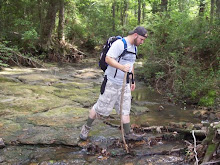
The most important piece of gear on any hiking or backpacking trip is the pair of boots on your feet. You can have the latest Granite Gear pack, Northface jacket and Eureka tent but if your boots don't hold up, neither will you. It's like your car on a road trip. Pack all the sandwiches you like to minimize food stops, but if your engine can't take it, your trip is over before it begins. Boots are that important. They're the foundation of every walking trip. So let's take a look at the boots that took me from Sulphur, LA to Boston, MA and back again.
Surprising as it might seem, the boots I chose were the cheapest items of my major gear. They were less than the backpack, tarp shelter, knife and sleeping bag. So why go cheap when footwear is so important? Because I'd owned a pair of these before.
The Canyon, by Magellan (Academy Brand) is an all leather hi-top boot with a black sole. They're nothing fancy to look at, just a classic-style leather hiking boot. A bit on the heavy side, but waterproof and tough. I purchased them for $50 at Academy in Lake Charles in late July and got them broken in. Being leather, they're a little stiff at first, but after wearing them for a week to work, they'd loosened up. By mid-August, they were ready for long trips.
Throughout the trip I spent countless hours pounding the pavement with a heavy pack on my shoulders, pressing my feet into my cheap boots. Walking on pavement is not my favorite thing to do, but when hitching, it's a must. A few times I walked about 20 miles on the shoulder of interstate, sidewalks and curbs. The unyielding concrete did little as the thick soles protected my feet from the torture. The only time I felt any soreness was at the end of Day 2 when I walked from Sulphur to Lake Charles, hitched to Welsh, and then walked to Jennings. My pack was heaviest then and my feet not yet toughened from the trip.
The boots held up over pavement, rocks, rough terrain and even railroad tracks. They took lacerations from jagged rocks and rusted metal. They were rained on, stomped through mud and water, slid down mountains and climbed back up again. They kept my ankles safe from sprains and awkward twisting while navigating rocky river beds and gripped true while scrambling along in the Appalachian Mountains. They kept the water out when I couldn't stay out of it and my feet stayed dry. They took all the abuse I could throw at them and never let me down.
But most of all they walked, and walked. And walked some more. I'm wearing those same Walkabout boots to work today, just like I have been every day since I finished the trip. Come to think of it, Magellan Canyons are the only shoes I've worn in the past four years...




